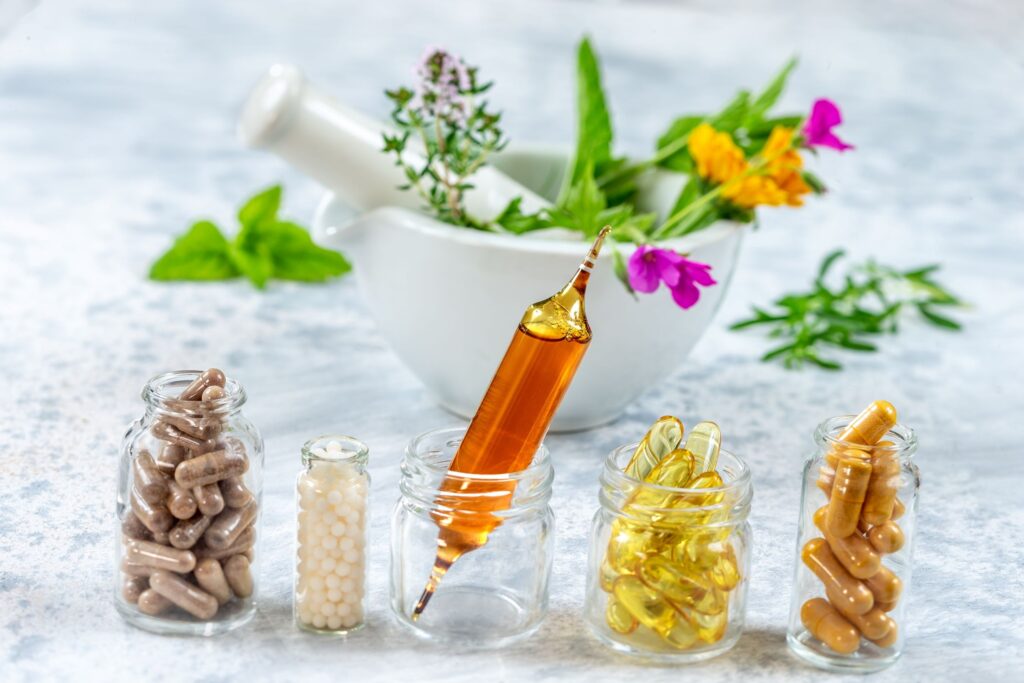14 Essential Women’s Supplements: Do You Get Enough?
In modern life, one thing is clear: We could all use more support. And we don’t just mean from your girlfriends.
How often did your mom tell you to “Take your vitamins!” and shove some gummy supplements in your face when you were a kid? Not just me, right? Now that you’re older and wiser, you know that vitamins aren’t actually good-for-you candy. Your body might need that extra supplement to stay healthy and strong.
It’s not enough to slather on sunscreen, moisturizer and the latest anti-wrinkle cream in the quest for a more youthful look. You need protection on the inside too.
When you consider how difficult it is to know with 100 percent certainty whether you’re eating precisely enough nutrients to fend off symptoms of deficiency or illness, supplements can certainly help, things get even a little more confusing when you decide to go vegetarian or get pregnant.
In addition to adding healthier foods to your shopping list, nutritional supplements can help fill in the gaps.
But with so many brands for women on the market, it can be hard to decide what supplements you should make a regular part of your regimen.

So, what supplements should women take daily?
You should try to meet the recommended daily intake of all vitamins, but there are occasions when you should try to get in an extra dose of them (think folic acid for pregnant women or those trying to conceive). To eliminate some of the guesswork, here’s a handy list of the most essential vitamins women should be getting every day, and exactly how much you should be consuming depending on your age and whether you’re pregnant or lactating.
Ideally, you should get these vitamins through the whole food sources listed below. But if that’s not possible, there are dietitian-recommended supplements and multivitamins you can take as well. Still, if you’re super concerned about a deficiency, make sure to chat with your doctor about whether you should make a lifestyle change.
Check out these fourteen super nutrients that every woman should consider.

1. Iron
Iron carries oxygen in the body, aids in the production of red blood cells, supports immune function, cognitive development, and temperature regulation, and is essential for proper cell growth.
Anaemia is the most common problem caused by iron deficiency. Women are at higher risk than men because they lose iron more rapidly. Low iron levels can also play a role in preterm labour, miscarriage, low birth weight and postpartum depression.
Most women are low in total body iron stores. They lose iron throughout their lives from periods, pregnancies and nursing and often don’t consume significant iron in their diets. They benefit from supplements to help prevent low energy, brain fog, thinning hair and brittle nails that all result from lack of iron.
Recommended daily intake: the adequate daily intake of iron supplements for women up to age 50 is 18 mg. After age 50, it is 8 mg. The tolerable upper intake is 45 mg.
2. Calcium
Calcium makes and keeps your bones and teeth strong, and helps muscles function.
Calcium is one of the best minerals for women because your body needs it for optimal bone health. Women start losing bone density in their twenties. Calcium is your single best defence, and you should start getting plenty of it now.
Low levels of calcium can cause osteoporosis and possibly lead to bone fractures later in life. Calcium also helps your body use vitamin D (which you get from fortified milk and some non-dairy sources) so that it can regulate calcium absorption in the intestines and make sure that your body gets the right amount of nutrients it needs to stay healthy.
Dairy products such as milk, cheese, and yoghurt, plus, dark-green leafy vegetables such as broccoli and kale are Calcium-filled food.
Recommended daily intake: eating 1,000 mg a day and taking a calcium supplement if you don’t eat enough dairy products.
The adequate daily intake for women aged 19-50 is 1,000 mg. After age 50, it is 750 mg. Women who are pregnant or breastfeeding may need to consume more than the RDI of 1,000 mg a day until they stop nursing or until six months after delivery.
3. Magnesium
Magnesium helps to regulate your heartbeat, muscle contractions and nerve impulses, so it’s important to get enough for a balanced diet. The RDA for men and postmenopausal women is 310 mg daily; however, many doctors believe that the RDA should be higher due to some studies showing that a magnesium supplement can help reduce the risk of heart attack, stroke and osteoporosis.
Recommended daily intake: The adequate daily intake for women aged 19 to 50 years is 400 mg. After age 50, it is 300 mg. Women who are pregnant or breastfeeding may need to consume more than the RDI of 400 mg a day until they stop nursing or until six months after delivery.
4. Zinc
Zinc also helps to maintain your sense of taste and smell, and it also plays a role in wound healing, immune function and the production of DNA and RNA. Low levels of zinc have been linked with increased risk of asthma, allergies, colds and flu, respiratory infections and reproductive problems such as miscarriage, low birth weight and preterm labour.
Recommended daily intake: The adequate daily intake for women aged 19 to 50 years is 11 mg. After age 50, it is 8 mg. Women who are pregnant or breastfeeding may need to consume more than the RDI of 11 mg a day until they stop nursing or until six months after delivery.
5. Vitamin A
Vitamin A is an antioxidant that helps maintain healthy skin, bones, teeth and eyesight. It’s also a key nutrient in the production of sex hormones like estrogen and progesterone.
It’s hard to overdo it on vitamin A because it’s stored in your body (unlike water-soluble vitamins), but you should still try to get most of your vitamin A from food sources (butter is a great source).
The only instance when you’d want to take a supplement would be if you’re pregnant or breastfeeding since it can be passed on to the baby through breast milk. If you’re vegetarian or vegan, talk with your doctor about whether dietary supplements are necessary for maintaining enough vitamin A in your diet.
Recommended daily intake: 1,000 IU per day for women ages 19-50, and 700 IU per day for women ages 51 and older.
6. Vitamin B9 (Folate)
Folate, or folic acid supplement, is a B vitamin that helps your body metabolize fats; it’s also involved in the release of energy from fat stores. A deficiency in folate can cause anaemia (low red blood cell count) due to inadequate production of haemoglobin (the protein that carries oxygen).
Folate is abundant in animal foods such as eggs and dairy products; it’s also found in whole grains, legumes and fruits like oranges. Vegetables like broccoli, turnips and tomatoes are good sources of folate as well as vitamin C.
Recommended daily intake: 400 mcg per day for women ages 19-50, 600 mcg per day for women ages 51-70 and 700 mcg per day for women over 70.
7. Vitamin B7 (Biotin)
Biotin is a coenzyme that helps your body metabolize fats, carbohydrates and proteins; it’s also involved in the release of energy from protein stores (amino acids). A deficiency in biotin can cause hair loss as well as skin problems like eczema and rashes.
Biotin is abundant in animal foods such as eggs and dairy products; it’s also found in whole grains, legumes and nuts. Vegetables like carrots, beets and broccoli are good sources of biotin as well as vitamin C.
Recommended daily intake: 30 mcg per day for women ages 19-50, 25 mcg per day for women ages 51-70 and 20 mcg per day for women over 70.
8. Vitamin C (Ascorbic Acid)
Vitamin C is a water-soluble vitamin that helps your body metabolize fats; it’s also involved in the release of energy from fat stores. A deficiency in vitamin C can cause scurvy (which can be fatal if left untreated), as well as skin problems like eczema and rashes.
Vitamin C is abundant in animal foods such as eggs, dairy products, meats and shellfish; it’s also found in fruits and vegetables like broccoli, bell peppers, cauliflower and citrus fruits. Vegetables like broccoli, bell peppers, cauliflower and tomatoes are good sources of vitamin C as well as vitamin E.
Recommended daily intake: 90 mg per day for women ages 19-50, 85 mg per day for women ages 51-70 and 75 mg per day for women over 70.
9. Vitamin D supplement (Cholecalciferol)
Vitamin D is a fat-soluble vitamin that helps your body metabolize fats; it’s also involved in the release of energy from fat stores. A deficiency in vitamin D can cause rickets, a bone disease that results in weak bones and osteoporosis.
Vitamin D is abundant in animal foods such as eggs, dairy products, fatty fish and fortified cereals; it’s also found in fortified soy milk, breakfast cereals and margarine. Vegetables like broccoli, cauliflower and mushrooms are good sources of vitamin D as well as vitamin E.
Recommended daily intake: 600 IU per day for women ages 19-50, 800 IU per day for women ages 51-70 and 1,000 IU per day for women over 70.
10. Vitamin E (Alpha-Tocopherol)
Vitamin E is a fat-soluble vitamin that helps your body metabolize fats; it’s also involved in the release of energy from fat stores. A deficiency in vitamin E can cause rickets, a bone disease that results in weak bones and osteoporosis.
Vitamin E is abundant in animal foods such as eggs, dairy products, fatty fish and fortified cereals; it’s also found in fruits, vegetables and nuts. Vegetables like broccoli, cauliflower, tomatoes and spinach are good sources of vitamin E as well as vitamin A.
Recommended daily intake: 30 IU per day for women ages 19-50, 40 IU per day for women ages 51-70 and 50 IU per day for women over 70.
11. Vitamin K
Vitamin K is a fat-soluble vitamin that helps your body metabolize fats; it’s also involved in the release of energy from fat stores. A deficiency in vitamin K can cause hemorrhagic disease of the newborn (Hemophilia), which results in bleeding into the brain or other organs.
Vitamin K is abundant in animal foods such as eggs, dairy products and fatty fish; it’s also found in fortified cereals, oilseeds and leafy green vegetables. Vegetables like broccoli, turnips and lettuce are good sources of vitamin K as well as vitamin A.
Recommended daily intake: 120 mcg per day for women ages 19-50, 140 mcg per day for women ages 51-70 and 160 mcg per day for women over 70.
12. Probiotics
Probiotics are beneficial to both women and men of all ages for maintaining a healthy microbiome and immune function. Probiotic supplementation can be especially helpful during menopause when estrogen production slows, and the subsequent depletion of lactobacilli creates a vaginal pH environment that is more vulnerable to pathogens.
Choose a brand of probiotic with varying strains to start.
Recommended daily intake: There’s no recommended dose of probiotics, but adding probiotic-filled foods into your diet may help reap these natural benefits.
13. Fish Oil (Omega-3 fatty acids)
Omega 3’s are anti-inflammatory and help with chronic pain, heart health and brain health. They also promote beautiful skin and aid in hormone balance for both men and women.
Omega-3 assists in proper brain operation (like memory and performance) and behavioural function, helps reduce high blood pressure, too.
Fish—particularly fatty fish like salmon, tuna, sardines, and mackerel—and plants and nut oils. Fish oil supplements are also a great option if you’re not a fan of eating seafood, but take less than three grams a day since fish oil can thin your blood.
It’s great to eat at least two 3.5-ounce servings of cooked fatty fish each week to get your fill of the omega-3s EPA and DHA for heart-health benefits.
Recommended daily intake: You can also take a daily supplement of 250 milligrams or more of EPA and DHA. Research shows that more than 1 gram daily provides brain-helping benefits. If you are a vegetarian, you can look for an algae-based omega-3 supplement.
14. Fiber
Fibre promotes a healthy digestive system, lowers the risk of heart disease by reducing LDL cholesterol levels, helps you feel full, and promotes weight loss.
Most women fall short on consuming enough. Adequate fibre intake can control blood sugar levels by slowing down the rate of sugar absorption. This process can help ward off type 2 diabetes.
Plant-based foods like fruits, vegetables, nuts, beans, grains, and legumes contain hearty doses of fibre. Keep in mind that fibre-enriched supplements which contain bowel-stimulating ingredients like wheat dextrin and psyllium husk respectively, do not contain other essential nutrients, so it’s best to consume via whole foods.
Recommended daily intake: You should eat around 30 g of fibre per day—but if your intake is significantly less than that now, increase your daily intake by 5 g until you get there.






